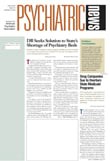Whether their lives are darkened by abuse, war, or homelessness, millions of children worldwide suffer the effects of trauma. This year, these children are the focus behind World Mental Health Day (WMHD).
WMHD is sponsored annually by the World Federation for Mental Health, an organization founded in 1948 to raise awareness about and advance the treatment of mental illnesses.
This year’s WMHD is October 10, and the theme is “The Effects of Trauma and Violence on Children and Adolescents.”
A WMHD planning kit and report issued this summer to health care professionals and organizations list some of the grim statistics related to trauma and children:
• The World Health Organization has found that 40 million children under age 15 are subject to abuse and neglect each year.
• The National Center for Children Exposed to Violence has reported that about 4 million adolescents have been victims of serious physical assault, and 9 million have witnessed physical violence.
• According to the 2001 Global Report on Child Soldiers, more than 300,000 children and adolescents below age 18 are fighting in armed conflicts.
“Trauma and violence either within the home or outside can shatter trust, self-esteem, and hope,” said Rosalynn Carter, former first lady and honorary chair of WMHD, in the federation’s report. “Prolonged and repeated traumatic experiences often result in serious mental health problems.”
The federation is using the report to educate families, health care professionals, and the general public about the need for trauma prevention in children.
The organization provides consultation to the United Nations and works closely with the World Health Organization, as well as with other international organizations. It also distributes educational materials to thousands of individuals and health-related organizations around the world to help them plan special events for WMHD.
Program literature distributed by the federation includes guidelines from a number of children’s organizations about how to protect children from trauma.
Some guidelines address trauma that can result from violence through the media, for instance, while others discuss strategies for lessening the effects of trauma from natural disasters or terrorist attacks.
The report also offers tips for organizations and health professionals about how to organize and publicize WMHD activities, for example, by conducting seminars on the prevention and effects of trauma in children.
Information about World Mental Health Day is posted on the Web site of the World Federation for Mental Health at www.wfmh.org. ▪
